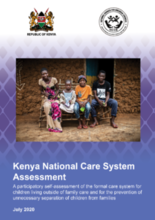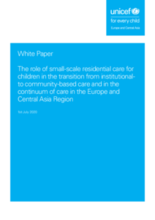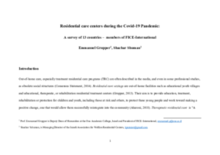Displaying 221 - 230 of 1482
This article describes the psychosocial resilience processes that facilitate successful transitioning of young women as they journey out of residential care towards young adulthood.
This care system assessment is intended to support the Government of Kenya to assess and strengthen the national, formal care system.
This White Paper summarizes evidence on the current use and impact of small-scale residential care (also: ‘SSRC’) and offers guidance on how to enable all children to grow up in a loving and stable family environment. It aims to promote better decisionmaking among policy-makers, local governments, non-governmental organizations (NGOs), as well as child welfare and other, allied practitioners of the establishment.
In response to the continuing need for agencies providing residential care and treatment to children and youth to develop and/or to enhance their ability to examine the effectiveness and efficiency of their services, this article explores successful strategies for building and sustaining research capacity in these settings.
Employing a systematic scoping methodology, this review examined the scope and breadth of literature focusing on children and young people living in residential care in Australia who have experienced sexual exploitation.
In this commentary piece, Anne Longfield, Children’s Commissioner for England, explores the use of children's care homes in England and the need for improved supports to prevent placement in children's home and to provide for the needs of children and young people who are placed in these homes.
Cracks in the System is a new report from Lumos that is the first of its kind to systematically explore the links between institutional care and child trafficking in Europe.
The purpose of this study was to longitudinally examine the effects of stigma on the development of children living in out-of-home care situations, specifically with regards to self-esteem and antisocial behavior.
Through the lens of institutional ethnography, this paper explores how experiences of education inside one Secure Children’s Home in England are shaped by the institution.
FICE Israel decided to initiate a short survey to document and share information about the way different countries handled their policies and practices in residential care facilities during that period. This report presents findings and some conclusions from this primary survey.




